Archive for January, 2011
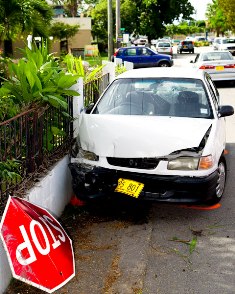
Number of road collisions real concern says senior cop
 (CNS): As the RCIPS’ annual holiday road safety campaign –Operation Rotate- came to a close officials have revealed that there were almost 300 smashes in a six week period. One senior police officer said that the number was excessive for such a small country and that action is required to improve road safety standards from all relevant agencies. During the campaign police said despite their warnings they still arrested 37 drunk drivers and 13 others for various driving related offences. They also detected more than 400 speeding offences and issued 333 other traffic tickets. (Photo Dennie WarrenJr)
(CNS): As the RCIPS’ annual holiday road safety campaign –Operation Rotate- came to a close officials have revealed that there were almost 300 smashes in a six week period. One senior police officer said that the number was excessive for such a small country and that action is required to improve road safety standards from all relevant agencies. During the campaign police said despite their warnings they still arrested 37 drunk drivers and 13 others for various driving related offences. They also detected more than 400 speeding offences and issued 333 other traffic tickets. (Photo Dennie WarrenJr)
Aside form the persistent drunk driving the number of road collisions and smashes in the time period has raised serious concerns.
“The number of road collisions during the period is a great concern,” said chief inspector Angelique Howard. “For a country the size of the Cayman Islands 298 collisions in six weeks is a terrible figure and clearly demonstrates the lack of care and attention paid by many people on our roads. The RCIPS intends to work closely with our partner agencies to develop a national road safety strategy – as it’s clear that much more needs to be done by all agencies involved in road safety to address this issue.”
She said overall Operation Rotate was a success especially as 37 drivers who ignored the police warnings have been taken off the roads and will now face court.
“Our high visibility approach worked and seven more drink drivers were taken off the street this year than during last year’s campaign (30 in 2009/2010),” Howard added. “Over 80 more roadblocks were conducted and many more offences were uncovered this year than last.”
Figures reveal that during this year’s campaign the police discovered 102 offences compared to just 34 in the previous years campaign.
“I think it’s clear that as a police service we were determined to make this operation a success and ultimately make the roads of the Cayman Islands safer for the majority of our road users,” the chief inspector said. “Unfortunately, we had one fatality on our roads during the campaign when Michael Edgington was knocked down on West Bay Road in December. Our condolences are with his family and friends. Mr Edgington’s death should have served as a warning to others about the dangers on our roads – however it does not appear that people took heed of those warnings.”
The Festive road safety campaign began on 22 November 2010 and concluded yesterday, Monday 3 January 2011.During the campaign there were:
51 arrests, of these, 37 arrests for DUI
403 speeding offences detected
333 traffic tickets issued for various offences
215 traffic offences reported
24 people found not to be wearing seatbelts
54 production slips issued
286 breath tests conducted
128 road blocks
63 stop and search operations undertaken
298 (two hundred and ninety-eight) road collisions

Doctors want to create fear of fat with graphic ads
 (The Age): Graphic advertisements showing damaged vital organs or people drinking liquefied body fat should be used to shock people into giving up junk food and sugary soft drinks, health groups have said. The Australian Medical Association says campaigns promoting healthy eating habits and exercise have failed to curb the obesity epidemic and shock tactics are now needed. In a submission to the state government the AMA describes obesity as ” the most pressing public health issue”, and calls for a $25 million advertising blitz to help tackle the crisis. They want a campaign modelled on recent New York City health department ads, which showed a man drinking a beaker full of body fat, and shovelling down 16 sachets of sugar.
(The Age): Graphic advertisements showing damaged vital organs or people drinking liquefied body fat should be used to shock people into giving up junk food and sugary soft drinks, health groups have said. The Australian Medical Association says campaigns promoting healthy eating habits and exercise have failed to curb the obesity epidemic and shock tactics are now needed. In a submission to the state government the AMA describes obesity as ” the most pressing public health issue”, and calls for a $25 million advertising blitz to help tackle the crisis. They want a campaign modelled on recent New York City health department ads, which showed a man drinking a beaker full of body fat, and shovelling down 16 sachets of sugar.
Health Minister David Davis said he would consider funding the AMA’s proposal as part of its next budget and it recognised ”the importance of tackling obesity as a significant public health issue”.

Facebook worth $50billlion
 (FT.com): Facebook has raised $500m of an anticipated $2bn in new funding from Goldman Sachs and other investors in a deal that values the dominant social network at around $50bn. That valuation implies Facebook is now worth more than Time Warner or Yahoo and almost twice as much as Google at the time of its 2004 initial public offering. It is also almost double the amount indicated by private sales of Facebook stock on secondary markets just five months ago. Goldman has formed a special fund to raise an additional $1.5bn from outside investors, people involved in the deal said. With an estimated 24 per cent stake in the company, the founder 26-year-old Mark Zuckerberg will have a paper fortune of $12bn.
(FT.com): Facebook has raised $500m of an anticipated $2bn in new funding from Goldman Sachs and other investors in a deal that values the dominant social network at around $50bn. That valuation implies Facebook is now worth more than Time Warner or Yahoo and almost twice as much as Google at the time of its 2004 initial public offering. It is also almost double the amount indicated by private sales of Facebook stock on secondary markets just five months ago. Goldman has formed a special fund to raise an additional $1.5bn from outside investors, people involved in the deal said. With an estimated 24 per cent stake in the company, the founder 26-year-old Mark Zuckerberg will have a paper fortune of $12bn.
Go to article
Environmentalists stop planned GM mozzie trial
(CNS): Although Cayman was at the centre of what has become controversial research involving the release of genetically modified mosquitoes in to the wild, a similar trial in Malaysia has now been delayed. The trial which is part of a project to combat dengue fever has been put off in the Asian country following protests from environmentalists. After the success of the trials in Grand Cayman the firm developing the GM mosquitoes was hoping to release the insects in Asia where the dengue virus is present. Some 4,000-6,000 modified male Aedes aegypti mosquitoes were scheduled to be released but due to fears that the GM mosquito could fail to prevent dengue and have unintended consequences the government has call off the test.
The GM mosquitoes have been engineered so that their offspring quickly die, curbing the growth of the population in a technique researchers hope could eventually eradicate the mosquito altogether and eliminate the dangerous dengue fever. Although the Aedes species which is responsible for spreading dengue does not carry the virus in Cayman the mosquito is present here hence why the islands were selected for the first part of the trial.
During the Cayman trial millions of the “mutant mozzies” as they have been dubbed were released into the wild in the district of East End. The project was recently described as an act of colonialism by GeneWatch an international NGS. The organisation, which investigates how genetic technologies will impact food, health, agriculture, environment and society, said Oxitec, the company carrying out the trial here in Cayman, had misleadingly claimed the mosquitoes released were sterile. The activists also accused the bio-firm of not carrying out ethical oversight before using Cayman for the trials.
Despite the environmentalists concerns local mosquito boss Bill Petrie the director of the Mosquito Research and Control Unit said the release of genetically modified mosquitoes in Grand Cayman posed no threat to people. He explained that the males don’t live very long so the trans-gene that they possess doesn’t persist in the environment.
The experiment revealed that by August a few months after the first GM insects were released in May the population had fallen by 80 percent, compared with a neighbouring area where no sterile male mosquitoes were released.
With the Cayman trial revealing promising results the ‘mutant mozzie’ was due to be released where the female mosquito is carrying dengue fever in Malaysia.
Oxitec, which is a spin-out company from Oxford University, insists that its GM mosquitoes are environmentally benign and represent the only hope of rolling back the global advance of dengue-infected mosquitoes.
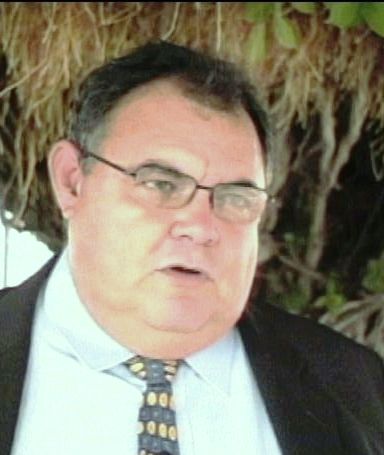
Unskilled expats in gov jobs
 (CNS): According to information released in response to an FOI request by a member of the public, the government is currently employing more than fifty unskilled foreign workers in various public sector roles. The issue has raised some concerns, especially when hundreds of unskilled Caymanians are currently out of work. The issue was highlighted just before Christmas when hundreds of unemployed locals turned out to try and get work on the government’s short term road clean-up employment project. The independent member of the Legislative Assembly for North Side, Ezzard Miller, has said the issue demonstrates a real disconnect between government and the people that need jobs.
(CNS): According to information released in response to an FOI request by a member of the public, the government is currently employing more than fifty unskilled foreign workers in various public sector roles. The issue has raised some concerns, especially when hundreds of unskilled Caymanians are currently out of work. The issue was highlighted just before Christmas when hundreds of unemployed locals turned out to try and get work on the government’s short term road clean-up employment project. The independent member of the Legislative Assembly for North Side, Ezzard Miller, has said the issue demonstrates a real disconnect between government and the people that need jobs.
The documents released under the FOI law reveal that at the end of November last year there were 58 unskilled foreign workers on government contracts employed in nine different government departments. With literally hundreds of local people looking for work as a result of the economic recession, Milller says he can’t understand why at least 54 people who are still on government contracts cannot be replaced by the locals that turned up for the road-side cleaning project. (Four of the contracts expired before the end of 2010 and it is not known if they were renewed.)
"This is the reality that is difficult to comprehend, certainly from the 800 applicants for the Christmas work government could find replacements for these 54 workers,” he said. “I have sent several persons to Environment Health looking for jobs without success, yet they have 15 contracts.”
Miller said that the problem is far more than just rhetoric about foreigners taking jobs from Caymanians. He said it represents a major economic problem as well. He explained that across the private sector government is receiving millions of dollars from work permits only to spend those millions on welfare to support its own local people when those unskilled Caymanian workers should be given these kinds of jobs.
“This is why the government receives $40 million in revenue from work permits and spends some 60 million on Social Services, a large portion of which is to support the unemployed and needy. There seems to be a huge disconnect between the government’s ‘unemployability’ and ‘the national interest, the buzz words of 2010,” the veteran politician said.
Getting Caymanians into work is one of government’s stated goals. However, Miller says, unless government leads by example inthe civil service and enforces the immigration laws, Caymanians will be marginalised. He said that at present there is no need for government to be using unskilled imported labour.
The documents reveal that there are five overseas contractors working at the Department of Agriculture, 12 in family services, three in District Administration, 14 in education, 15 at environmental health, two in the Governor’s Office, two at the Mosquito Research and Control Unit, two in the Prison Service and three working in the Department of Youth and Sports.
The jobs include cooks, agricultural workers, farm labourers, bus drivers, cleaners, house keepers, maintenance staff, painters, work crew at the landfill, and solid waste drivers, among others.

Public finance law to change
 (CNS): The way public finances are managed is to be changed during 2011, the premier has revealed, as he says it is the requirements of the Public Management and Finance Law which have cause the surge in bureaucracy for government. McKeeva Bush told CNS that many of the stumbling blocks to projects and plans to get the economy going that he has encountered since coming into office are down to the PMFL. He said the law was introduced to make government more open, and even though it was important to be transparent, the law shouldn’t hold up efforts to improve the country’s financial fortunes. The premier said it would be reviewed and changed over the coming months to preserve the principles of transparency but allow things to move ahead more quickly and remove the red tape.
(CNS): The way public finances are managed is to be changed during 2011, the premier has revealed, as he says it is the requirements of the Public Management and Finance Law which have cause the surge in bureaucracy for government. McKeeva Bush told CNS that many of the stumbling blocks to projects and plans to get the economy going that he has encountered since coming into office are down to the PMFL. He said the law was introduced to make government more open, and even though it was important to be transparent, the law shouldn’t hold up efforts to improve the country’s financial fortunes. The premier said it would be reviewed and changed over the coming months to preserve the principles of transparency but allow things to move ahead more quickly and remove the red tape.
Bush said the country had to encourage development in order to create jobs and stimulate the economy. “But we have areal problem with bureaucracy,” he said, speaking at a brief press conference during the recent regional conference hosted by the Jamaican Building Society at the Ritz Carlton.
Speaking about the differences he encountered coming to office in May 2009 in comparison to his previous time as the country’s head of government, he said the biggest problem was the procurement process and the impact of the PMFL.
The premier pointed to the changes under the law that had created a system that slowed things down. “The trouble was everyone said government had to be more open and we needed to change the laws for the government procurement process but it has created bureaucracy.”
He said elements of the PMFL were just not workable and too costly for a small country and the law had to be revised
“While we want good governance and we will preserve many of the tenets of the law, it has to be made workable,” Bush said, adding that the auditor general was already looking at the PMFL and the procurement process.
Bush came under fire in 2010 and was accused of breaking the law when he overrode a decision made by the Ministry of Finance’s technical team and the Central Tenders Committee for the provision of financing for government’s loan of $155million. At the time Bush said the choice made by the team and the CTC was not good value for money for government. As a result, in a controversial move he negotiated a separate deal with New York based firm, Cohn and Company, but the full details of that loan agreement have not yet been finalised.
Bush has also publicly criticised some of the boards, the overseas government authorities and processes, as well as the 21-day public review period before a law is brought to the Legislative Assembly for debate and passage. Since taking office he has railed against red tape and what he has described as the dragging of feet over government business.
In his recent general report on the state of government finances, Auditor General Alistair Swarbrick also recommended a review of the public management and finance law. His office is also currently examining the government procurement system and how central tendering works.

Burst pipe slows up morning traffic
 (CNS): Drivers coming into George Town from the eastern districts on their first morning returning to work after the holidays are likely to hit traffic queues. The Water Authority said it has a broken water main in the Pease Bay area of Bodden Town. Service to customers in the area of Kipling St to Midland Acres has been interrupted and will continue for approximately another 3 hours officials said. As workers try to make repairs drivers are asked to take extra care and obey all road signs.
(CNS): Drivers coming into George Town from the eastern districts on their first morning returning to work after the holidays are likely to hit traffic queues. The Water Authority said it has a broken water main in the Pease Bay area of Bodden Town. Service to customers in the area of Kipling St to Midland Acres has been interrupted and will continue for approximately another 3 hours officials said. As workers try to make repairs drivers are asked to take extra care and obey all road signs.
“The Water Authority Operations crew is working diligently to identify the exact location of the leak and complete the necessary repairs,” the authority said as it it apologized for the inconvenience.
.
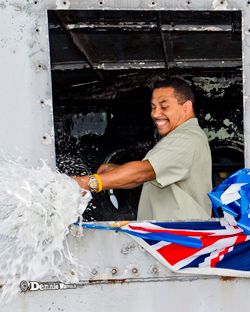
Kittiwake hits another snag
 (CNS): With winds expected to exceed 12 knots tomorrow the sinking of the Kittiwake has been postponed yet again. After seven years in the planning and endless snags and delays as a result of a number of different issues, the weather has again upset the schedule at the final hurdle. During a dedication service aboard the vessel on Monday Stephen Broadbelt from the Cayman Islands Tourism Association explained that for both environmental and safety reasons the ship cannot be sunk unless the wind drops below 12 knots. Provided the winds fall the sinking is now expected to take place on Wednesday at 10am.(Photosby Dennie Warren Jr)
(CNS): With winds expected to exceed 12 knots tomorrow the sinking of the Kittiwake has been postponed yet again. After seven years in the planning and endless snags and delays as a result of a number of different issues, the weather has again upset the schedule at the final hurdle. During a dedication service aboard the vessel on Monday Stephen Broadbelt from the Cayman Islands Tourism Association explained that for both environmental and safety reasons the ship cannot be sunk unless the wind drops below 12 knots. Provided the winds fall the sinking is now expected to take place on Wednesday at 10am.(Photosby Dennie Warren Jr)
The former US naval vessel is set to become an artificial reef and will at some point be laid on the sea bed off the coast of Seven Mile Beach via a controlled sinking. The ship will be sunk as a result of holes drilled into the vessel and then lowered down on to the sea bed in a set position. Once in its final resting place nature will take its course when sea life begins to make the Kittiwake home creating a new dive attraction.
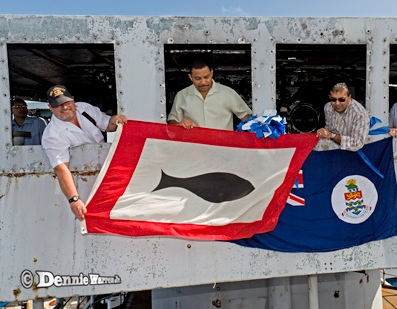 Cline Glidden represented the Cayman Islands government in Monday’s dedication service for the vessel (pictured above) which the tourism industry is pining hope on for a much needed boost. Following the service residents and visitors alike headed to West Bay public beach to hop on the free tenders to tour around the Kittiwake which is currently stationed at the location where eventually the vessel will be sunk. (Photo Dennie Warren Jr – John Glatstein, ex-crew member with Cline Glidden and Harry Lalli CITA president)
Cline Glidden represented the Cayman Islands government in Monday’s dedication service for the vessel (pictured above) which the tourism industry is pining hope on for a much needed boost. Following the service residents and visitors alike headed to West Bay public beach to hop on the free tenders to tour around the Kittiwake which is currently stationed at the location where eventually the vessel will be sunk. (Photo Dennie Warren Jr – John Glatstein, ex-crew member with Cline Glidden and Harry Lalli CITA president)
For more information on the Kittiwake visit www.kittiwakecayman.com
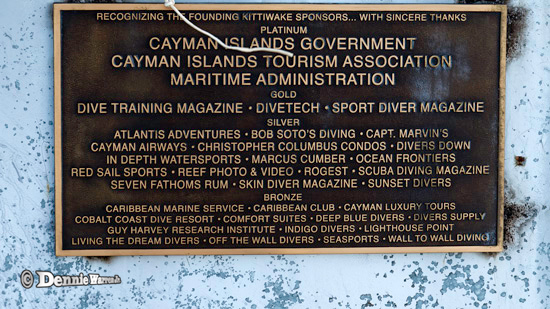

New airline service boosts Canadian arrivals
 (CNS): According to the latest statistics from the Department of Tourism the start of the WestJet service appears to have provided a significant boost to the air passenger arrivals from Canada. The November 2010 tourism figures reveal that air passenger arrivals were up by 2537 on November 2009 with the largest increase being from Canada. The number of passengers flying into the Cayman Islands from that country increased by 43.1% on the previous year. There was also an increase in air passengers of more than 12% during November from the United States. Cruise visitors were also on the up with a 30% increase on 2009 figures for November.
(CNS): According to the latest statistics from the Department of Tourism the start of the WestJet service appears to have provided a significant boost to the air passenger arrivals from Canada. The November 2010 tourism figures reveal that air passenger arrivals were up by 2537 on November 2009 with the largest increase being from Canada. The number of passengers flying into the Cayman Islands from that country increased by 43.1% on the previous year. There was also an increase in air passengers of more than 12% during November from the United States. Cruise visitors were also on the up with a 30% increase on 2009 figures for November.
The DoT figures revealed that 154,258 cruise passengers called on Cayman in November 2010 compared with 118,292 in November 2009. The total number of accumulated passengers arriving in Cayman for 2010 so far is now at 1,422,245 setting the scene for the best year for cruise visitors since 2007.
Although air passenger arrivals for the whole of 2010 are not likely to break any records if December has a similar percentage increase will ensure an improvement on 2009’s figures. Air arrivals also increase from Europe by over 3% and only visitors from UK & Ireland declined where 24 less people came to Cayman.
WestJet, which is a seasonal service started on 5 November and flies between Toronto and Grand Cayman three times per week.
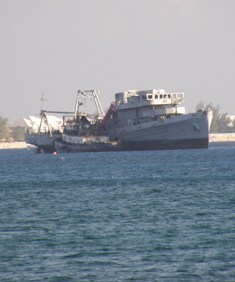
DoT invites all to tour Kittiwake before sinking
 (CNS): Currently anchored off Seven Mile Beach the former USS Kittiwake is now being ready for her sinking on Tuesday morning. Once settled on the ocean floor the ship will become an artificial reef and hopeful attract members of the dive community far and wide. However, before the ship is set for her final resting place the Department of Tourism is inviting the public to tour around the vessel and learn all about her history and how she has become the country’s latest tourist attraction. Tour boats will depart from the West Bay Public Dock around every 30 minutes between 2:00 – 4:00pm on Monday afternoon. Tours are free and are provided on a first come first served basis, courtesy of Cayman Islands Tourism Association.
(CNS): Currently anchored off Seven Mile Beach the former USS Kittiwake is now being ready for her sinking on Tuesday morning. Once settled on the ocean floor the ship will become an artificial reef and hopeful attract members of the dive community far and wide. However, before the ship is set for her final resting place the Department of Tourism is inviting the public to tour around the vessel and learn all about her history and how she has become the country’s latest tourist attraction. Tour boats will depart from the West Bay Public Dock around every 30 minutes between 2:00 – 4:00pm on Monday afternoon. Tours are free and are provided on a first come first served basis, courtesy of Cayman Islands Tourism Association.
The ship arrived in Cayman on Christmas morning and the sinking is currently scheduled for 10am on Tuesday morning.
The 251-foot, 2,200 ton, five-deck military vessel, which served the United States Maritime Administration (US MARAD) for over 50 years after it was commissioned in 1945arrived after a 10-day towing period from the James River Reserve Fleet in Virginia, USA.
A project of the Ministry and Department of Tourism in partnership with the Cayman Islands Tourism Association (CITA), the idea for acquiring the Kittiwake to create a new dive attraction for the Cayman Islands had its genesis some seven years ago. The Cayman Islands’ acquisition of the decommissioned naval vessel marks the first time that a US MARAD ship has been donated to a foreign government for the creation of an artificial reef.